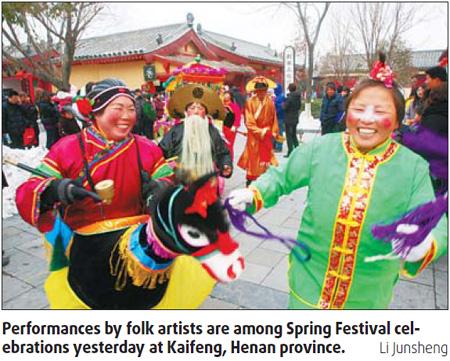
The Internet has played a larger role in the celebration of Spring Festival this year, with more young Chinese sending online greetings to family members and tuning into web-based entertainment.
Social network website kaixin001.com said more than 100 million messages were sent from the mainland on Feb 13, the eve of Chinese Lunar New Year, and Feb 14, the first day of the Year of the Tiger.
"Most Chinese born between the 1970s and 1990s belong to the only-child generation. They have been influenced by the Internet and have had their will to communicate face-to-face weakened," said Zhai Li, a professor at Northwest Agriculture & Forestry University in Yangling, Shaanxi province.
Spring Festival is a time for family members to reunite, as well as an opportunity to visit temple fairs. But some young Chinese said they preferred to spend the holiday shopping online and enjoying virtual fireworks, instead of setting off firecrackers in the street.
"After so many years, the holiday brings few surprises. I usually feel tired during the week and would rather stay at home," said 24-year-old Li Ying, who works at a State-owned company in Guiyang, capital of Guizhou province.
According to statistics from taobao.com, the country's biggest online retail site, transaction volume of Spring Festival special goods exceeded 1 billion yuan ($147 million) in January alone, much higher than the 280 million yuan a year earlier.
"The online fair and shopping online for the festival are closely related to stronger consumption," said Zhang Jibo, a teacher with Huazhong Normal University in Wuhan, capital of Hubei province.
Meanwhile, more young people have chosen to watch online festival galas instead of sitting in front of the television from 8 pm to midnight watching the China Central Television's (CCTV) Spring Festival Gala, the country's most watched annual show.
The gala, with a kaleidoscopic array of singers, dancers and comedians, is one of the most viewed television programs in the world.
But the gala's staid stand-up routines and traditional singing and dancing performances have been criticized as outdated by audiences in recent years, with many turning to online entertainment galas to welcome the New Year.
An interactive Internet Spring Festival gala kicked off last Saturday, jointly organized by sina.com, Beijing TV and China Mobile. Netizens could vote for performers whom they want to see in the performance line-up.
The gala was broadcast on sina.com and on Beijing TV on Feb 6-12. Tianya.cn also broadcast an online gala, already in its fourth year, on Feb 11 for its 33 million registered members.
"I prefer the online Spring Festival gala as it gave youths the opportunity to choose our favorite performances, while the CCTV gala has too many restrictions," said Chen Han, a postgraduate from Wuhan University, who watched the online gala with friends.
"The tradition would survive only if it could win approval among young people. In the Internet era, youths long to voice their opinions, which can hardly be realized in a television performance," said Li Hao, deputy secretary general of the Shandong Folklore Society.
China's Internet community hit 384 million last year, with one in three online users younger than 19, according to China Internet Network Information Center.
Xinhua contributed to the story
Related News
Photos
More>>trade
market
finance
- Jinan:the Chinese Lantern Festival brightened in Snowflak
- Law Enforcement Department in Tianqiao District: to Safeguard the Art Examinatio
- Jiyang: Colorful Activites for the Chinese Lantern Festival Will be Held
- Jinan: Price of Vegetables Falls after the Spring Festiva
- Jinan earnestly studied and carried out the Spirit of the Shandong Industrial





